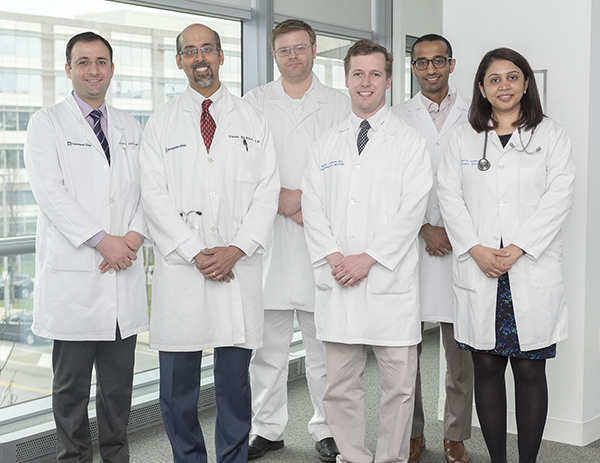Overview

Innovation in healthcare delivery is crucial to healthcare reform. Currently, the majority of efforts in healthcare delivery innovation have focused on global changes occurring at the healthcare payment and policy level. There is very limited information on healthcare delivery innovation from the perspective of patients and healthcare providers (i.e., physicians and hospitals).
The Center for Healthcare Delivery Innovation has been developed to evaluate issues in healthcare delivery innovation from the perspective of patients and healthcare providers.
Core Areas of Focus
The Center for Healthcare Delivery Innovation focuses on four major areas of healthcare delivery to improve medical care, quality, outcomes and cost-effectiveness.
The Four Circles of Quality: Outcomes, Appropriateness, Process/Systems and Access: Improvement of healthcare quality is one of the most important aspects of healthcare reform. Our understanding of what quality is and how it is to be improved is in its infancy. Critical investigation into issues of patient outcomes, appropriateness, process/systems and access is an area of great promise.
Innovations in Healthcare Delivery: It is widely believed that improvements in healthcare delivery are simple and self-evident. However, any change in healthcare delivery risks being ineffective, leading to unintended consequences or having negative impact on patient outcomes. Therefore, all efforts in healthcare delivery innovation require rigorous assessment of efficacy and safety.
Electronic Medical Records and Medical Informatics: Billions of dollars have been spent on implementing electronic medical records under the assumption that this will improve medical care. Yet data on the clinical impact of electronic medical records are limited, and potential pitfalls with implementation of these records have not been examined. Understanding the true impact of electronic medical records and the potential promise of medical informatics is an important research goal.
Value, Healthcare Payment and Economics: Healthcare value lies at the interface of quality and cost. To date, efforts to improve value have often been focused on cost issues unilaterally, without assessment of their impact on quality. In addition, the role of the payment system and economics within the entire healthcare delivery innovation space has great potential for analysis.
Needs to be Addressed
The Center for Healthcare Delivery Innovation has the ability to use measures, data and resources to evaluate current systems and processes to improve healthcare delivery in the future.
Impact of Quality Improvement Efforts on True Patient-Related Quality: Increased transparency and public reporting of patient safety indicators has been assumed to lead physicians to improve the quality of care and reduce the risk of complications. However, there are no data to measure what the real impact of these efforts is. We now have the ability to measure true changes in clinical outcomes with public reporting of patient safety indicators.
Accuracy of Electronic Medical Records: The advent of electronic medical records has led to pronouncements of revolutionary improvements in care, particularly with “big data.” The fundamental accuracy of data within electronic medical records has been subject to limited testing. We now can measure accuracy of electronic medical record information to determine the validity of this information.
Clinical Trial Enrollment: Given typical costs of $10 to $100 million per trial, clinical trials constitute serious investments on behalf of industry and government sponsors. Many clinical trials fail to achieve enrollment goals, leading to lost investments and unanswered clinical questions. We now have analytic capabilities to assess clinical trials prior to beginning enrollment to determine whether the trials will achieve successful enrollment or will fail.
Incentive Payments for Quality: CMS and private payers have indicated that they will transform from fee-for-service to value-based payment systems. The effectiveness of these novel payment systems to effectively reward quality is unknown. We now have data to determine the effectiveness of these novel payment systems.
Improving Health Care in the Future
- The Center for Healthcare Delivery Innovation will systematically understand and analyze problems and issues in healthcare delivery innovation with particular (but not exclusive) focus on cardiovascular diseases.
- The Center will create novel measurement systems and put together sophisticated analyses.
- The Center will assist in the operationalization of solutions for problems within the Heart, Vascular & Thoracic Institute and Cleveland Clinic.
- The Center will measure the impact of healthcare delivery innovations and apply rigorous biostatistical techniques to assess efficacy and safety.
- The Center will disseminate findings and solutions to internal areas within Cleveland Clinic and to external areas such as regulatory agencies, industry, research journals and the public domain as appropriate.
Medical Team
Umesh Khot, MD – Director |
Lars Svensson, MD, PhD – Chairman, Heart & Vascular Institute |

From L to R: Mouin Abdallah, MD, Umesh Khot, MD, Matthew Summers, MD, Michael Johnson, MD, Chetan Huded, MD, Antonette Karrthik, MBBS
(Not Pictured: Newton Wiggins, MD, Rayji Tsutsui, MBChB)
Contact
Dr. Umesh Khot
Center for Healthcare Delivery and Innovation
Cleveland Clinic
9500 Euclid Ave, Desk 2-4
Cleveland, OH 44195
216.445.4440